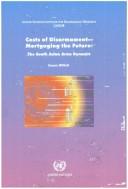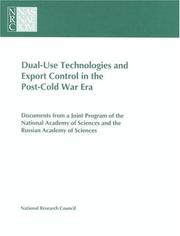| Listing 1 - 5 of 5 |
Sort by
|

ISBN: 9290451610 141754807X 9789290451617 Year: 2003 Publisher: Geneva UNIDIR
Abstract | Keywords | Export | Availability | Bookmark
 Loading...
Loading...Choose an application
- Reference Manager
- EndNote
- RefWorks (Direct export to RefWorks)
355.019 --- Ontwapening --- 355.019 Ontwapening --- Disarmament --- Arms control --- Economic aspects --- E-books --- Security, International --- Arms race --- Military readiness --- Limitation of armament --- Military power --- Armed Forces --- Military weapons --- Peace
Book
ISBN: 1911529412 Year: 2016 Publisher: London Ubiquity Press
Abstract | Keywords | Export | Availability | Bookmark
 Loading...
Loading...Choose an application
- Reference Manager
- EndNote
- RefWorks (Direct export to RefWorks)
While disarmament, demobilization and reintegration (DDR) and security sector reform (SSR) have become integral statebuilding tools in post-conflict states, the existing empirical literature examining their relationship has focused on supply-side considerations related to the programming of both processes. In practice, though, DDR and SSR are implemented in the wider context of war-to-peace transitions where the state is attempting to establish a monopoly over the use of force and legitimize itself in the eyes of domestic and international communities. This paper therefore assumes that to identify opportunities and constraints for establishing closer practical linkages between DDR and SSR it is important to take the local politics into consideration. It examines two past externally driven peacebuilding interventions in West Africa, namely Liberia and Sierra Leone, featuring cases in which the central state had essentially fragmented or collapsed. Through this comparative analysis, the paper aims to provide a stepping-stone for future studies examining demand-side considerations of DDR and SSR in post-conflict contexts.
Politics & government --- Warfare & defence --- Disarmament. --- Peace-building. --- Building peace --- Peacebuilding --- Conflict management --- Peace --- Peacekeeping forces --- Limitation of armament --- Military power --- Armed Forces --- Arms control --- Arms race --- Military readiness --- Military weapons --- Security, International --- security sector reform --- good governance --- peacebuilding --- transition --- DDR --- demobilization
Book
ISBN: 1787439933 1787438546 1787438554 1787544427 9781787438545 9781787438552 Year: 2019 Publisher: Bingley, UK
Abstract | Keywords | Export | Availability | Bookmark
 Loading...
Loading...Choose an application
- Reference Manager
- EndNote
- RefWorks (Direct export to RefWorks)
Excessive military spendingreduces the available financial reserves for health,education, and other human needs. For poor countries, it increases poverty, unemployment, and destitution.It also strengthens dictatorial tendencies in politics and acts against democratic values. If we want to achieve peace, eliminate poverty, decrease inequality, and achieve social justice, we should devote all our energies to reducing military spending and using the released resources for economic development. For that, we need a concerted effort to encourage disarmament. This newvolume provides reflections and insights from leading public figures and activists who oppose military expenditure in any form. Many of the contributions to this volume were presented as speeches at the 'Disarm! For a Climate of Peace' meeting held in Berlin in 2016, organized by the International Peace Bureau. The volume also includes additional research-oriented chapters to complement the transcripts from the International Peace Bureau meeting.
Disarmament. --- Peace. --- Coexistence, Peaceful --- Peaceful coexistence --- International relations --- Disarmament --- Peace-building --- Security, International --- War --- Limitation of armament --- Military power --- Armed Forces --- Arms control --- Arms race --- Military readiness --- Military weapons --- Peace --- Economic development. --- Political Science --- Political activism. --- Development, Economic --- Economic growth --- Growth, Economic --- Economic policy --- Economics --- Statics and dynamics (Social sciences) --- Development economics --- Resource curse

ISBN: 0309050316 9786610211296 1280211296 0309586356 0585084858 9780585084855 6610211299 9780309050319 Year: 1994 Publisher: Washington, D.C. National Academy Press
Abstract | Keywords | Export | Availability | Bookmark
 Loading...
Loading...Choose an application
- Reference Manager
- EndNote
- RefWorks (Direct export to RefWorks)
POLITICAL SCIENCE --- Public Policy / Economic Policy --- Export controls --- Technology transfer --- High technology industries --- Commerce --- Business & Economics --- International Commerce --- Disarmament --- Economic aspects --- Limitation of armament --- Military power --- Export licenses --- Export restrictions --- Licenses, Export --- Technological transfer --- Transfer of technology --- Law and legislation --- Armed Forces --- Arms control --- Arms race --- Military readiness --- Military weapons --- Peace --- Security, International --- Foreign trade regulation --- Diffusion of innovations --- Inventions --- Research, Industrial --- Technology and international relations --- Foreign licensing agreements --- Technological forecasting --- Technological innovations --- Technology --- International cooperation
Book
ISBN: 1442643226 1442695684 9781442643222 9781442695689 Year: 2016 Publisher: Toronto University of Toronto Press
Abstract | Keywords | Export | Availability | Bookmark
 Loading...
Loading...Choose an application
- Reference Manager
- EndNote
- RefWorks (Direct export to RefWorks)
"The Idea of a Moral Economy is the first modern edition and English translation of three questions disputed at the University of Paris in 1330 by the theologian Gerard of Siena. The questions represent the most influential late medieval formulation of the natural law argument against usury and the illicit acquisition of property. Together they offer a particularly clear example of scholastic ideas about the nature and purpose of economic activity and the medieval concept of a moral economy. In his introduction, editor Lawrin Armstrong discusses Gerard's arguments and considers their significance both within the context of scholastic philosophy and law and as a critique of contemporary mainstream economics. His analysis demonstrates how Gerard's work is not only a valuable source for understanding economic thought in pre-modern Europe, but also a fertile resource for scholars of law, economics, and philosophy in medieval Europe and beyond."--
Usury --- Restitution --- Prescription (Law) --- Economics --- Natural law --- Law, Medieval. --- Philosophy, Medieval. --- Theology --- Droit médiéval --- Philosophie médiévale --- Théologie --- Moral and ethical aspects --- History --- Histoire --- Gerardus, --- Usure --- Restitution (Droit) --- Prescription (Droit) --- Economie politique --- Droit naturel --- Early works to 1800 --- Early works to 1800. --- Ouvrages avant 1800 --- Aspect moral --- Medieval philosophy --- Droit médiéval --- Philosophie médiévale --- Théologie --- Medieval law --- Economic theory --- Political economy --- Immemorial usage --- Usucapio --- Interest and usury --- Loan sharking --- Law and legislation --- Scholasticism --- Social sciences --- Economic man --- Acquisition of property --- Real property --- Adverse possession --- Land titles --- Limitation of actions --- Time immemorial (Law) --- Replevin --- Unjust enrichment --- Interest rates --- Law, Medieval --- Philosophy, Medieval --- E-books --- Usury - Early works to 1800 --- Restitution - Early works to 1800 --- Prescription (Law) - Early works to 1800 --- Economics - Moral and ethical aspects - Early works to 1800 --- Natural law - Early works to 1800 --- Theology - History - Middle Ages, 600-1500 --- Gerardus, - de Senis, - -1336? - Quaestio de usura --- Gerardus, - de Senis, - -1336? - Tractatus de restitution --- Gerardus, - de Senis, - -1336? - Quaestio de praescriptione
| Listing 1 - 5 of 5 |
Sort by
|

 Search
Search Feedback
Feedback About UniCat
About UniCat  Help
Help News
News